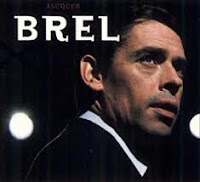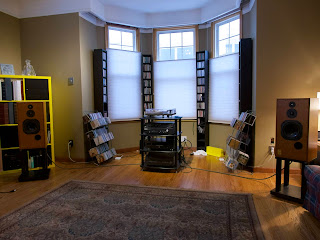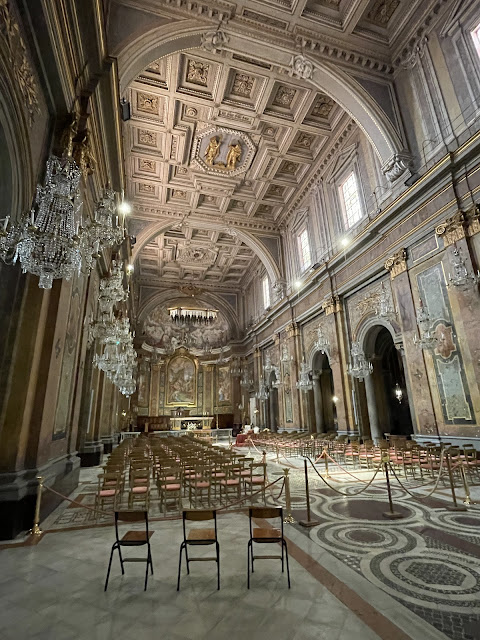A Little Wine & the "Enfant Terrible"
Why are we attracted to the "bad" boys and girls in music and poetry for that matter? Think of the many artists who have gone before their time partly due to living rather mixed up lives. The popular thesis of the day is that many of them were prophets little understood in their own time who struggled because of their inability to reconcile to the circumstances around them.
A television show without conflict will probably never make it to air. Maybe the more intimate reality is that we are aware of our own incompleteness and artists sometimes make sense of human struggle in ways that we can't or don't articulate on our own.
In the discipline of the spiritual life that requires one to be accountable not only to God but to a spiritual confidante who is also a guide -- another person, over time the imperceptible steps toward more authentic living can unfold. Not necessarily opposed to this is what we reveal about ourselves when we "let our hair down".
In the tavern, therefore, we find a rich testimony of music that tells the human story in diverse ways. Indeed, a great deal of the folk tradition around the world owes its existence to communal experiences of being unselfconscious.
And so is born the balladeer, the chanteuse, the bard and in more the recent past, the folk musician. The story of jazz in its many forms and the blues and of urban music also bear this mark.
Of course, not all music sung at the bar imparts wisdom or gives us something to positively reflect on in our lives. As with other things, we need to be discerning. Some things to think about:
I. How rich a picture of human life is being portrayed? Is there only one emotion being expressed, and what is the effect of the emotional content of the piece on me?
II. Does the piece help me to understand others or my own life in a more articulate way that will help me to live more generously?
III. Does the piece express any openness, or hope? Many pieces of music contain lamentation and even anger. Well, so do the Scriptures in places. The question is, what is done with these feelings? Openness will allow the "good, the bad, and the ugly" of life to be exposed to the light. A piece may be dark and for good reason. Life is not always fair and there is evil in the world. But either in how we receive it or how we are invited to receive it, how are we left? Even a very great artistic statement may not always be one we are ready to receive.
 It was St. Paul who said that one should take a little wine "for the stomach's sake." Catholics through the centuries have taken Paul up on his suggestion. In fact, there are still monasteries in Germany which have a monopoly in the neighbouring town to sell beer produced by the monks. And if you have only been accustomed to commercially produced beer your taste buds may be in for a shock if you taste beers produced today by Belgian and Dutch Trappist monks.
It was St. Paul who said that one should take a little wine "for the stomach's sake." Catholics through the centuries have taken Paul up on his suggestion. In fact, there are still monasteries in Germany which have a monopoly in the neighbouring town to sell beer produced by the monks. And if you have only been accustomed to commercially produced beer your taste buds may be in for a shock if you taste beers produced today by Belgian and Dutch Trappist monks.
I grew up in the 70's. Aside from disco and hard rock there was a big pop music scene. One of the musicians who came out of that time was Billy Joel, e.g. "The Piano Man". Although he was packaged like a pop star, his songs come straight of the balladeering tradition. His trail was probably blazed by the popular folk singers of the 60's like Bob Dylan.
One balladeer who stands out in bridging the bar and the monastery is Johnny Cash. He lived a hard life, but through his life he became an ambassador for those who struggle in life and tried demonstrably to live a life of integrity and generosity.
Sometimes the story ends differently. Some who achieve popularity end up consumed by the confusion in their own lives that often is magnified by celebrity. We should be careful not to live off these folks and their troubles. As with any neighbour we should pray for them.
Great art is also produced by those who are healthy and in fact we can be more productive if we are leading basically healthy lives. Although no saint at least in his outward behaviour, Bach was clearly a happy guy who used his gifts generously. In fact, he enjoyed little fame in his life and yet we play more than 1,000 of his pieces today.
 In the bard department, I recently picked up a double disc of Jacques Brel. He was a figure I knew nothing about, but he was a firm part of the "chanson" tradition in the 50's and 60's which is still very much alive in France, flavoured with equal parts of irony and "joie de vivre." The great Edith Piaf is the pre-eminent 20th century representative of this tradition.
In the bard department, I recently picked up a double disc of Jacques Brel. He was a figure I knew nothing about, but he was a firm part of the "chanson" tradition in the 50's and 60's which is still very much alive in France, flavoured with equal parts of irony and "joie de vivre." The great Edith Piaf is the pre-eminent 20th century representative of this tradition.
 In Canada we have been blessed with rich traditions of folk music. In Quebec, French but also Irish traditions are reflected. All across Canada, fiddle music derives from the souls of the country's early settlers. In Ontario we had a great balladeer who lived just a little too early to be recorded often and well enough: Wade Hemsworth, e.g., "The Black Fly Song". Stan Rogers died young but strictly due to unfortunate circumstance. He provided us with songs reflecting the beauty and struggles of working men and women, inland and in the Maritime provinces although he was from the shores of Lake Ontario. When I was growing up, Murray McLaughlin and Gordon Lightfoot came out of the Toronto coffeehouses in Yorkville (a much dirtier place then). When I see the diversity we have in our country it would be my hope that folk traditions brought from around the world will increasingly find a place here and an expression that gives people living here a vision of a rich life coming out of and sometimes despite the circumstances they may be in.
In Canada we have been blessed with rich traditions of folk music. In Quebec, French but also Irish traditions are reflected. All across Canada, fiddle music derives from the souls of the country's early settlers. In Ontario we had a great balladeer who lived just a little too early to be recorded often and well enough: Wade Hemsworth, e.g., "The Black Fly Song". Stan Rogers died young but strictly due to unfortunate circumstance. He provided us with songs reflecting the beauty and struggles of working men and women, inland and in the Maritime provinces although he was from the shores of Lake Ontario. When I was growing up, Murray McLaughlin and Gordon Lightfoot came out of the Toronto coffeehouses in Yorkville (a much dirtier place then). When I see the diversity we have in our country it would be my hope that folk traditions brought from around the world will increasingly find a place here and an expression that gives people living here a vision of a rich life coming out of and sometimes despite the circumstances they may be in.
In a somewhat different artistic voice is the work of Leonard Cohen, who despite his some time bawdiness seems almost to have a Catholic sensibility about the sacredness of life and its mysteries.
I've listened to a little of Adele as well. Stylistically, she is a bit bluesy to my ears and so really part of a deep musical tradition. Her songs are speaking to many people. Her possible future legacy is still unfolding. Certainly competing with her would have been Amy Winehouse. Her struggles were very public. As a public we need to know we are not neutral. To simply listen to music that "pushes the boundaries" or to chase celebrities whose lives seem out there and mixed up may be pushing them further out. It seems to me that we need the musical prophets of our own day, but like our desire for everyone else, we need them to be healthy and safe. In a way, it is very sad to see sales of Michael Jackson and Whitney Houston achieve record levels in death. What did we do to help them in life?
So the tavern may be where we start to reflect on life, but it should not be the end. Although a little wine (or beer for that matter) for the stomach's sake is okay.
A television show without conflict will probably never make it to air. Maybe the more intimate reality is that we are aware of our own incompleteness and artists sometimes make sense of human struggle in ways that we can't or don't articulate on our own.
In the discipline of the spiritual life that requires one to be accountable not only to God but to a spiritual confidante who is also a guide -- another person, over time the imperceptible steps toward more authentic living can unfold. Not necessarily opposed to this is what we reveal about ourselves when we "let our hair down".
In the tavern, therefore, we find a rich testimony of music that tells the human story in diverse ways. Indeed, a great deal of the folk tradition around the world owes its existence to communal experiences of being unselfconscious.
And so is born the balladeer, the chanteuse, the bard and in more the recent past, the folk musician. The story of jazz in its many forms and the blues and of urban music also bear this mark.
Of course, not all music sung at the bar imparts wisdom or gives us something to positively reflect on in our lives. As with other things, we need to be discerning. Some things to think about:
I. How rich a picture of human life is being portrayed? Is there only one emotion being expressed, and what is the effect of the emotional content of the piece on me?
II. Does the piece help me to understand others or my own life in a more articulate way that will help me to live more generously?
III. Does the piece express any openness, or hope? Many pieces of music contain lamentation and even anger. Well, so do the Scriptures in places. The question is, what is done with these feelings? Openness will allow the "good, the bad, and the ugly" of life to be exposed to the light. A piece may be dark and for good reason. Life is not always fair and there is evil in the world. But either in how we receive it or how we are invited to receive it, how are we left? Even a very great artistic statement may not always be one we are ready to receive.
 It was St. Paul who said that one should take a little wine "for the stomach's sake." Catholics through the centuries have taken Paul up on his suggestion. In fact, there are still monasteries in Germany which have a monopoly in the neighbouring town to sell beer produced by the monks. And if you have only been accustomed to commercially produced beer your taste buds may be in for a shock if you taste beers produced today by Belgian and Dutch Trappist monks.
It was St. Paul who said that one should take a little wine "for the stomach's sake." Catholics through the centuries have taken Paul up on his suggestion. In fact, there are still monasteries in Germany which have a monopoly in the neighbouring town to sell beer produced by the monks. And if you have only been accustomed to commercially produced beer your taste buds may be in for a shock if you taste beers produced today by Belgian and Dutch Trappist monks. I grew up in the 70's. Aside from disco and hard rock there was a big pop music scene. One of the musicians who came out of that time was Billy Joel, e.g. "The Piano Man". Although he was packaged like a pop star, his songs come straight of the balladeering tradition. His trail was probably blazed by the popular folk singers of the 60's like Bob Dylan.
One balladeer who stands out in bridging the bar and the monastery is Johnny Cash. He lived a hard life, but through his life he became an ambassador for those who struggle in life and tried demonstrably to live a life of integrity and generosity.
Sometimes the story ends differently. Some who achieve popularity end up consumed by the confusion in their own lives that often is magnified by celebrity. We should be careful not to live off these folks and their troubles. As with any neighbour we should pray for them.
Great art is also produced by those who are healthy and in fact we can be more productive if we are leading basically healthy lives. Although no saint at least in his outward behaviour, Bach was clearly a happy guy who used his gifts generously. In fact, he enjoyed little fame in his life and yet we play more than 1,000 of his pieces today.
 In the bard department, I recently picked up a double disc of Jacques Brel. He was a figure I knew nothing about, but he was a firm part of the "chanson" tradition in the 50's and 60's which is still very much alive in France, flavoured with equal parts of irony and "joie de vivre." The great Edith Piaf is the pre-eminent 20th century representative of this tradition.
In the bard department, I recently picked up a double disc of Jacques Brel. He was a figure I knew nothing about, but he was a firm part of the "chanson" tradition in the 50's and 60's which is still very much alive in France, flavoured with equal parts of irony and "joie de vivre." The great Edith Piaf is the pre-eminent 20th century representative of this tradition.  In Canada we have been blessed with rich traditions of folk music. In Quebec, French but also Irish traditions are reflected. All across Canada, fiddle music derives from the souls of the country's early settlers. In Ontario we had a great balladeer who lived just a little too early to be recorded often and well enough: Wade Hemsworth, e.g., "The Black Fly Song". Stan Rogers died young but strictly due to unfortunate circumstance. He provided us with songs reflecting the beauty and struggles of working men and women, inland and in the Maritime provinces although he was from the shores of Lake Ontario. When I was growing up, Murray McLaughlin and Gordon Lightfoot came out of the Toronto coffeehouses in Yorkville (a much dirtier place then). When I see the diversity we have in our country it would be my hope that folk traditions brought from around the world will increasingly find a place here and an expression that gives people living here a vision of a rich life coming out of and sometimes despite the circumstances they may be in.
In Canada we have been blessed with rich traditions of folk music. In Quebec, French but also Irish traditions are reflected. All across Canada, fiddle music derives from the souls of the country's early settlers. In Ontario we had a great balladeer who lived just a little too early to be recorded often and well enough: Wade Hemsworth, e.g., "The Black Fly Song". Stan Rogers died young but strictly due to unfortunate circumstance. He provided us with songs reflecting the beauty and struggles of working men and women, inland and in the Maritime provinces although he was from the shores of Lake Ontario. When I was growing up, Murray McLaughlin and Gordon Lightfoot came out of the Toronto coffeehouses in Yorkville (a much dirtier place then). When I see the diversity we have in our country it would be my hope that folk traditions brought from around the world will increasingly find a place here and an expression that gives people living here a vision of a rich life coming out of and sometimes despite the circumstances they may be in. In a somewhat different artistic voice is the work of Leonard Cohen, who despite his some time bawdiness seems almost to have a Catholic sensibility about the sacredness of life and its mysteries.
I've listened to a little of Adele as well. Stylistically, she is a bit bluesy to my ears and so really part of a deep musical tradition. Her songs are speaking to many people. Her possible future legacy is still unfolding. Certainly competing with her would have been Amy Winehouse. Her struggles were very public. As a public we need to know we are not neutral. To simply listen to music that "pushes the boundaries" or to chase celebrities whose lives seem out there and mixed up may be pushing them further out. It seems to me that we need the musical prophets of our own day, but like our desire for everyone else, we need them to be healthy and safe. In a way, it is very sad to see sales of Michael Jackson and Whitney Houston achieve record levels in death. What did we do to help them in life?
So the tavern may be where we start to reflect on life, but it should not be the end. Although a little wine (or beer for that matter) for the stomach's sake is okay.

